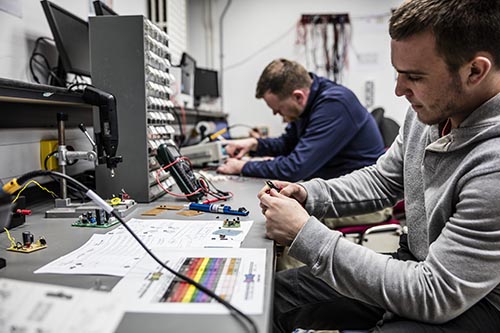Engineering Technology with Electronics Level 5 QQI Award

Course Details
- Dun Laoghaire Further Education Institute
- South Dublin City, South Dublin County
- Engineering, Electronic Engineering
- € 50.00
- Further Education and PLC, Level 5 QQI
- 1 Year
- Start Date: 15/09/2025
Course Description
Duration:
This is a Full-time one-year course, which runs from September to May. Exact details of the timetable will be given out to students during the induction process prior to class commencement in September.
Overview:
Engineering is transforming how we live, work and study. Engineering is a highly diversified and exciting profession with a wide range of specialisms emerging as new technologies, business models and engineering challenges develop. From life-saving biomedical technology to energy-efficient housing, engineers are developing innovative solutions for the benefit of society. Today’s engineering students will have the opportunity to work on technologies that have not yet been invented. For those who wish to embark on a career in engineering, this innovative course will prepare participants for entry into third level, through a range of practical and theoretical subjects.
Entry Requirements:
One of the following:
- Leaving Certificate (LC Established, LCVP, LCA) or equivalent
- A Full QQI Level 4 Award (or equivalent)
- For Mature applicants (aged 21 or over) – appropriate experience will be considered in lieu of formal qualifications. Note: Mature applicants may be entitled to VTOS funding. For details about VTOS, please contact the college.
- Applicants whose first language is not English require level B2 competency on the CEFR language framework. Applicants may be required to undergo English language testing to establish their language competency.
Course Modules:
- Engineering Workshop Processes
- Communications
- Work Experience
- Control Systems
- Electronics
- Computer Aided Drafting (2D)
- Mathematics
- The Internet
Certification:
Level 5 QQI Award Engineering Technology (5M2061)
Special Features:
Experience University Life
In January, the students are treated to a week-long opportunity in TU Dublin – Tallaght Campus to experience the facilities and take part in Labs and lectures in the Electronics Department, as part of the Electronics module.
This course is supported by FIT, which offers students the opportunity to acquire essential skills to gain employment. Students are given training in job interview techniques and CV preparation.
Free Full Suit of Adobe Software for all students on this course for one year to facilitate assessment.
All DFEi students are provided with an M365 account, which gives them access to the tools and resources needed to deliver assessment work while attending their course. M365 Apps include Word, PowerPoint, Excel, Outlook, and OneDrive.
Work Experience:
Students will be required to undertake a period of work placement in an organisation connected to their vocational area during the academic year. Work Experience is mandatory for all of our full-time Level 5 courses. Students are required to source their own work placement but will be assisted in this by the work experience teacher. The work placement is usually for a period of 10 days or a minimum of 60 hours. Students usually find the work experience element of the course to be invaluable and should bear in mind that a successful work placement can sometimes lead to further opportunities.
Assessment:
The following techniques will be used to assess the knowledge and skills that students will have achieved on successful completion of modules:
- Student Record
- Portfolio/Collection of Work
- Skills Demonstration
- Assignment
- Examinations – written or practical
- Project
All assignments are submitted electronically. Therefore all students need access to a device such as a computer/laptop.
A full major award is granted on passing the relevant eight components. On successful completion of each component, you will be awarded a pass, a merit or a distinction grade. See www.qqi.ie for more details
Progression Opportunities:
DFEI: Graduates may progress to the QQI Level 6 Advanced Certificate in Computer Software Development and Networking
Elsewhere: Graduates are eligible to apply through the CAO and/or the Higher Education Links Scheme for entry to year one of a range of higher certificate and degree programmes, at Universities, Institutes of Technology and Technological Universities using their full QQI Level 5 major award. Places are not guaranteed in these Institutes and are subject to students meeting certain criteria. It is the student’s responsibility to consult with the relevant HEI for information on the admissions process and any specific entry requirements. Students may also refer to the individual HEI prospectus or may also refer to the QQI FET section of the CAO website. www.cao.ie
Examples of CAO progression opportunities are listed below.
Progression Examples:
BEng Sustainable Energy and Environmental Engineering (TU702)
BEng Electronic Engineering (TU726, TU829)
BEng Mechanical Engineering (TU717, TU828)
BEng Electronics and Communications Engineering (TU714)
BEng Civil Engineering (TU704)
BEng Engineering (TU708, TU709, TU804)
BTech Networking Technologies (TU716)
Technological University Dublin – www.tud.ie
BSc Computing in Software Development (DK821)
BSc Computing in Games Development (DK820)
Dundalk Institute of Technology – www.dkit.ie
BSc in Product Design (MH305)
Bsc in Robotics and Intelligent Devices (MH306)
Maynooth University – www.nuimaynooth.ie
BSc Software Development Mobile Apps (AL705)
Athlone Institute of Technology – www.ait.ie
BSc Software Development (CW207, CW238)
Institute of Technology Carlow – www.itcarlow.ie
BEng Civil Engineering (GY402)
BEng Mechanical Engineering (GY405)
BEng Electronic and Computer Engineering (GY406)
BEng Electrical and Electronic Engineering (GY414)
Galway University – www.nuigalway.ie
Career Paths:
Graduates have a wide range of career opportunities such as network support, software development, electronic service technician, test and repair technician, electronic and computer engineering, and access control installation.


